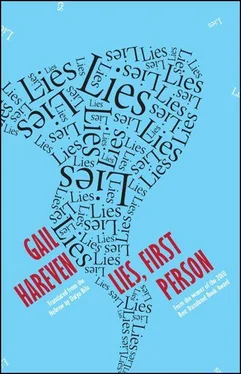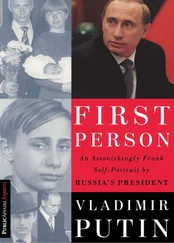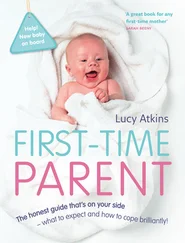Suddenly I realized how close the day was when I would have to act and how unprepared I was, and therefore I removed myself in order to enable myself to prepare.
There was no point in asking Chemi exactly when they were going to meet “that professor,” because the date was no longer important. Because already with the “blood and fire and pillars of smoke” and the puddle on my plate, I had grasped that the dinner with the conference guests was only one of the illusions I had allowed myself to harbor: Not-man sowed confusion, and I in my fear and foolishness had become confused and wasted my time on fantasies of some imaginary restaurant on Keren Hayesod Street.
There would be no meeting between my family and First Person, and even if there were, I could not permit myself to waste any more time on restaurants, because it was not there, not in a restaurant, not in the presence of my loved ones, that I would finish him off.
When did I know that I would have to kill him? On the Saturday when he phoned and invaded my home? During our stay in Seattle, when I realized how he was robbing me of my family? And perhaps long before that, in the days of the basement apartment when my sister told me things, or even before that, when a thumb had been poked into my breast, or perhaps when I called the gynecologist and confirmed that the abortion had taken place, while the orchid in its flowerpot still stood on the counter of Pension Gotthilf.
Even now I can’t say when it became inevitable. But after Monticello and after Elisheva’s pardon, ever since I had remained alone with the First Person, ever since then — you could say that I knew.
When a normal human being, a normal woman, begins to think about how to kill someone, her first thoughts naturally tend toward art and fantasy. One day it came into my head that I would follow Menachem and Rachel into the restaurant in Keren Hayesod Street, and poison him there. The first image I saw was of a cyanide capsule bursting between his teeth. Did such capsules still exist and if so, where would I find one? Because one was enough, that was what was so good about cyanide. I remembered reading somewhere that cyanide had a “pronounced smell of bitter almonds.” A smell of bitter almonds — a pronounced smell of bitter almonds would therefore rise from his open mouth. And what if somebody identified the smell and tried to bring him back to life? Cyanide kills instantly. And I didn’t want it to be quick, and I also didn’t want his body twitching and convulsing in front of Rachel and Menachem. And I was also afraid of the resuscitation attempts on the part of some paramedic sitting at the next table, rushing to breathe into a mouth full of cyanide.
It was important to me to protect Rachel and Menachem; I feared for the young paramedic enjoying a long-awaited date.
And then I went on to think of other substances, the kind that kill slowly: gold dust, copper, lead, which in the opinion of certain scholars destroyed the Roman empire. I once read that the Romans believed that copper protected the body from the effects of lead poisoning. Was it possible that the water in the restaurant was served in copper jars? Could the copper neutralize the effect of the lead?
Digoxin, which is prescribed for cardiac patients and destroys the healthy, was a much surer bet, and also readily available. It would be easy enough to find a doctor who would prescribe digoxin without a second thought.
These were the amazing fantasies that came into my head, but I don’t blame myself for them. I was prevented from serving in the army, I had never held a weapon in my hands, and almost everything I knew about killing I had learned from works of art.
•
For many years the roof of the Jewish Agency building in King George Street had prominently displayed a sign that read: “What to do? Do!” At some point during the course of the seder, it was when we were already eating dessert, I suddenly remembered this sign, and its words silenced the turmoil of my thoughts: What to do? Do! And after a moment I think I giggled, because the observer inside me observed that you can never know what will calm the troubled soul: a poem, a philosophical saying, or a silly slogan on the roof of the Jewish Agency.
The Passover seder came to an end. The guests thanked their hosts and dispersed. The two couples whose children were abroad kissed the hostess. And the clerk offered to drive the niece to the hotel where her group was staying. Three couples got into three cars and drove off in three directions.
No plot twist took place on that night. And no secret was revealed. The only change that took place was that as I sat at the table together with all the House of Israel and the First Person, I returned to reality and was able to once more distinguish between a plan and a fantasy: time was short, and I needed a plan.
Heavy with wine and too much to eat, Oded went straight to bed. If he noticed my silence that same night he probably attributed it to a physical condition similar to his own. My husband fell asleep; it was close to midnight, and I embarked on a thorough spring-cleaning of my house.
From the day that I moved in with Oded I became a house-proud woman, and the traces of the cave-dweller I had been till then disappeared. Even when we could afford to hire a maid, I refused to allow a stranger deal with our dirt like most of our friends did, and for the most part I found a measure of unfashionable satisfaction in keeping our territory spick and span.
The house was clean and tidy, which somewhat eased the complicated task of making it kosher for Passover. Cupboards were opened. Files were stacked on the table. Papers were packed into one big garbage bag, worn out kitchen utensils in another. Shoes were consigned to a third. There’s something sad about old shoes, and when I closed the bag I thought that I would at least not leave this sadness of worn out shoes behind me.
There were thirteen days left to the official appearance of the First Person on the scene, and I was determined to leave a clean space behind me: this was the least I could do for those who had been my Garden of Eden.
I was about to end it, and even though I still didn’t know how, it was clear to me that however much I thought and planned, the chances of my getting away after the deed was done were slim. I didn’t have the strength to consider what would happen afterward. I assumed I’d go to jail. I assumed that I would be interrogated, and I assumed that I would say nothing. Because what kind of discourse could there be with a world where a god exists who expects a rape victim to forgive, what could you say to those who duplicate the First Person three hundred one thousand times, who fly him from country to country, give him a life, work, and an audience, and set cream cakes in front of him?
Come what may, I thought, I would not hide behind the inarticulate little girl who was turned into a reader aloud of the works of the Marquis de Sade. Her, that little girl, I would not give them. I wasn’t that little girl. And in any case now, I too was alone and locked up and suffocating, and those outside didn’t hear, and even if they heard they wouldn’t understand, because from outside it’s impossible. It takes two to understand.
What to do? Do! Because in the beginning was the act. What would happened afterward was out of my hands.
My vision of after-the-act was patchy and full of holes. I saw myself silent, I realized how the sick world would interpret my silence, and in one of the less-faded patches of my imagination I heard a smug, self-satisfied male voice explaining:
“We have before us a case of a morbid obsession regarding a book. According to our information, it appears that Elinor Brandeis believed that she was destroying not the author of Hitler, First Person but Hitler himself. This kind of confusion between author and narrator is not uncommon among unsophisticated readers, and a learned writer such as Professor Gotthilf was no doubt aware of the risk he was taking when he chose to speak in the devil’s voice.”
Читать дальше












